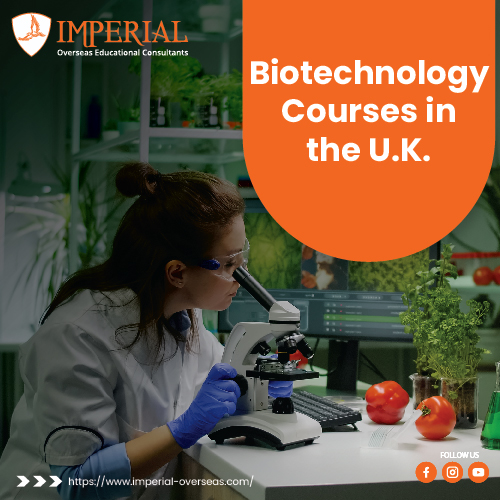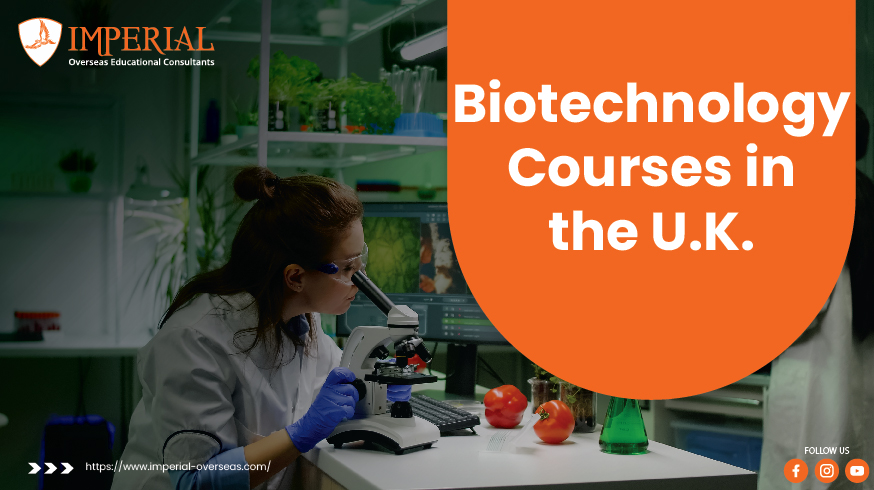
Biotechnology Courses in the U.K.

Biotechnology Courses in the U.K.
Biotechnology courses have been a widely popular choice in applied science since its inception. With the world needing better nutrition and medical resources, work environments and industries warmly welcome dedicated bioscientists and skilled technicians to their workforce. After the covid era, research and industrial actions to counter possible pandemic situations have further fueled more students opting for a biotechnology degree.
In this regard, there has been an increased outflow of Indian students to U.K. institutes in search of pursuing course programs in Microbiology. There are several reasons for international students to opt for a specialisation degree in Biotechnology from the U.K. Let’s discuss the question in detail to understand the feasibility of the same.
Why study biotechnology courses in the U.K.?
Among the most popular international academic destination choices, the U.K. ranks first when it comes to Biotechnology programs. Primarily, the prestigious image of the U.K. as an upholder of high educational standards is a significant reason for the same. Additionally, shorter course periods and flexibility in choosing course specialisations also posit attractive choice factors among students. Apart from this, the wide variety of specialisation models offered here is a significant reason.
What are the top biotechnology courses in the U.K.?
- Bsc Biotechnology: BSc Biotechnology is a three-year undergraduate program that deals with detailed theoretical, practical, and research themes of the biotechnology domain. Over the course period, students are introduced to various essential themes and tools required to boost their careers.
- MSc Applied Bioscience and Biotechnology: MSc Applied Bioscience and Biotechnology is a one-year-long specialisation post-grad program. This course gives students the necessary academic support to plan and conduct original research on biotechnology themes.
- MSc Advanced Chemical Engineering with Biotechnology: MSc Advanced Chemical Engineering with Biotechnology is a one-year program that helps students widen their study base and incorporate multi-disciplinary learning models into their research.
- MPhil in Biotechnology: Mphil program in Biotechnology focuses on creating an interface between technical excellence and research design in the Biotechnology domain. Here, a wide range of associated themes, like Engineering, Chemistry, Materials Sciences and Metallurgy, Pharmacology, Biochemistry, and Genetics, are deeply discussed to create a holistic understanding.
- MSc in Bioscience Enterprise: Unlike the traditional technical programs in Biotechnology, the MSc in Bioscience enterprise focuses on creating an interdisciplinary study on the business and management principles involved in Biotechnology applications in Industrial arrangement. Accordingly, it helps students to gain employment as leaders in global multinational corporations working with biotech.
What qualifications do I need to study biotechnology courses in the U.K.?
- Imperial College London: Over here, students have several course choices within the broad ambit of Biotechnology, including BSc Biotechnology, MSc Applied Biotechnology and BioScience, MSc Chemical Engineering and Biotechnology, and so on. Moreover, the research options offered are helpful for international students to realise their academic ambitions.
- University of Cambridge: BSc Chemical Engineering and Biotechnology course from the University of Cambridge is one of the most sought-out course programs in the United Kingdom, as it provides a flexible course structure in biotechnology where the student can either choose to complete a BSc degree in three years or pursue a four-year degree to gain MEng with BSc here.
- University College of London: The MSc Engineering Management program is offered with a specialisation choice in Biotechnology. It helps aspiring leaders and management enthusiasts combine their passion for technology with management science.
How long do biotechnology courses in the U.K. typically last?
With the increased academic options offered in the domain, many Indian students are finding their way into the international forum, especially in the United Kingdom. One primary reason behind the increased influx is how a biotechnology degree program from the U.K. helps students gain rewarding employment opportunities right after completion.
Unlike the traditional three-year degree programs in India, the courses offered in the universities of the U.K. have a wider course coverage with specialisation choices in Pharmacology, Chemical engineering, Bioengineering, and Microbiology.
Additionally, undergraduate course programs last three to four years, while post-graduate programs, including MPhil and MSc, usually have a one-year course.
Career after Biotechnology
When it comes to applied sciences like Biotechnology, there are countless career options before the students. In this regard, several international students opt for a specialisation degree in Biotechnology from the United Kingdom as multiple institutions specialise in Biotechnology services to their customer base.
Some of them include :
Aspiring professionals with proper educational qualifications find rewarding careers as research assistants, biostatisticians, Biotechnology instructors, and Lab supervisors, among other options.
Find your aim, Set the dream, and Join the Imperial.
Pursuing your dreams of overseas education requires a guide to pinpoint the right course choices to help you get there. With Imperial Overseas Education, you can understand the various course choices, institutions, scholarships, and career options related to a biotechnology program.
Contact us today and begin the next phase of your academic journey confidently.



